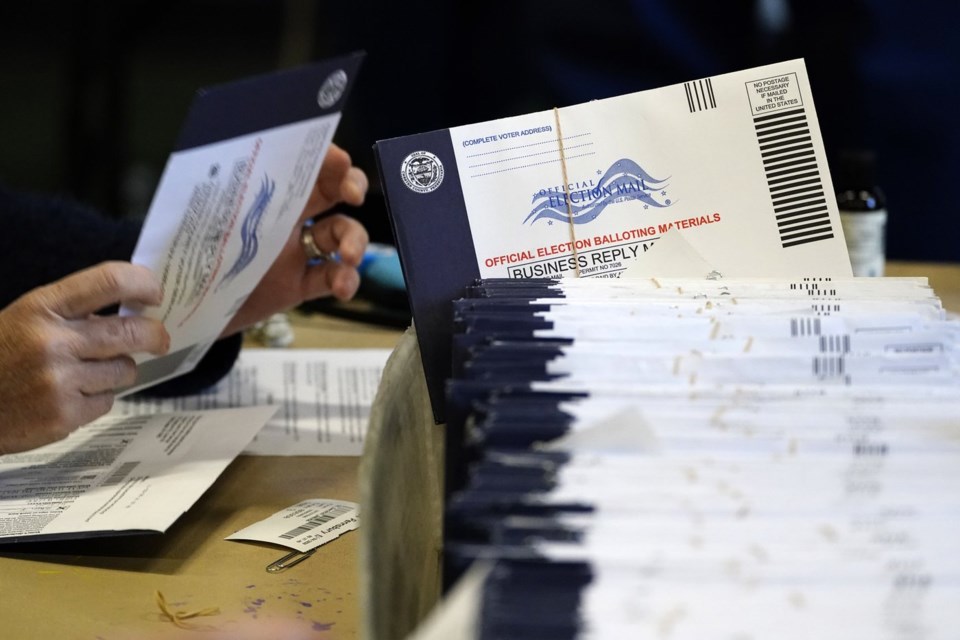WASHINGTON (AP) — Democratic officials in 19 states filed a lawsuit Thursday against President Donald Trump's attempt to reshape elections across the U.S., calling it an unconstitutional invasion of states' clear authority to run their own elections.
is the fourth against the issued just a week ago. It seeks to block of it, including new requirements that people provide documentary proof of citizenship when registering to vote and a demand that all mail ballots be received by Election Day.
“The President has no power to do any of this,” the state attorneys general wrote in court documents. “The Elections EO is unconstitutional, antidemocratic, and un-American.”
Trump's order said the U.S. has failed “to enforce basic and necessary election protection." Election officials have said recent elections have been among the most secure in U.S. history. There has been no indication of any widespread fraud, including when to Democrat Joe Biden in 2020.
The is the culmination of Trump’s about how U.S. elections are run. After his first win in 2016, Trump his popular vote total would have been much higher if not for “millions of people who voted illegally.” In 2020, Trump blamed a “rigged” election for his loss and widespread voter fraud and manipulation of voting machines.
Trump has argued his order secures the vote against illegal voting by noncitizens, though multiple studies and investigations have shown that it's rare.
It has received praise from the top election officials in some Republican states who say it could inhibit instances of voter fraud and will give them access to federal data to better maintain their voter rolls.
The order also requires states to exclude any mail-in or absentee ballots received after Election Day, and puts states' federal funding at risk if election officials don’t comply. Some states count ballots as long as they are postmarked by Election Day or allow voters to correct minor errors on their ballots.
Forcing states to change, the suit says, would violate the broad authority the Constitution gives states to set their own election rules. It says they decide the “times, places and manner” of how elections are run.
Congress has the power to “make or alter” election regulations, at least for federal office, but the any presidential authority over election administration.
“We are a democracy – not a monarchy – and this executive order is an authoritarian power grab,” said New York Attorney General Letitia James.
Rhode Island Attorney General Peter Neronha said the Trump administration is requiring states to either comply with an unconstitutional order or lose congressionally approved funding, something he said the president has no authority to do.
“In one fell swoop, this president is attempting to undermine elections and sidestep the Congress, and we’re not going to stand for it,” he said.
California Attorney General Rob Bonta said Trump’s executive order was an attempt to impose “sweeping voting restrictions” across the country and disenfranchise voters.
The attorney general and secretary of state in Nevada, a presidential battleground, defended their state's elections as fair, secure and transparent, and objected to the president's attempt to interfere in how they are run. Attorney General Aaron Ford praised Nevada’s automatic systems for registering voters and distributing mail ballots.
“While this order is on its face unconstitutional and illegal, it is also unnecessary,” he said.
A request for comment sent to the White House was not immediately returned.
The lawsuit was filed in U.S. District Court in Massachusetts by the Democratic attorneys general of Arizona, California, Colorado, Connecticut, Delaware, Hawaii, Illinois, Maine, Maryland, Massachusetts, Michigan, Minnesota, Nevada, New Jersey, New Mexico, New York, Rhode Island, Vermont and Wisconsin.
filed over the order argue it could disenfranchise voters because millions of eligible voting-age Americans do not have the proper documents readily available. People are already required to attest to being citizens, under penalty of perjury, in order to vote.
Under the order, documents acceptable to prove citizenship would be a U.S. passport, a REAL ID-compliant driver’s license that “indicates the applicant is a citizen," and a valid photo ID as long as it is presented with proof of citizenship.
Democrats argue that millions of Americans do not have easy access to their birth certificates, about half don’t have a U.S. passport, and married women would need multiple documents if they had changed their name. That was during recent town elections in New Hampshire, the first ones held under a new state law requiring proof of citizenship to register.
Not all REAL ID-compliant driver's licenses designate U.S. citizenship.
___
Cassidy reported from Atlanta. Associated Press writers Tran Nguyen in Sacramento, California, Holly Ramer in Concord, New Hampshire, and Rio Yamat in Las Vegas contributed to this report.
Lindsay Whitehurst And Christina A. Cassidy, The Associated Press




